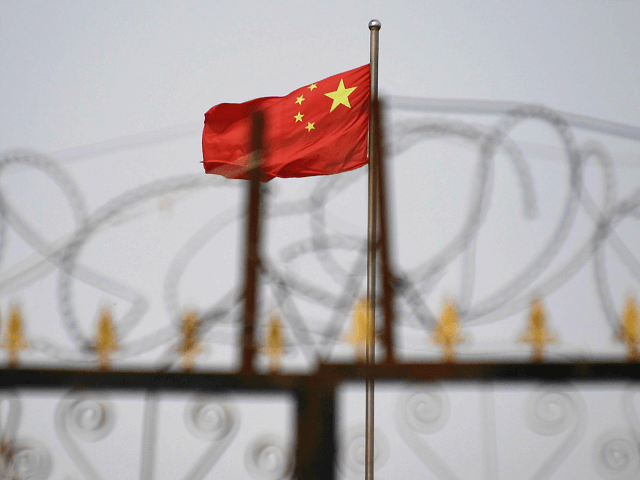Chinese state television on Monday aired a “confession” from a Taiwanese academic named Cheng Yu-chin who said he engaged in espionage activities against the People’s Republic of China (PRC).
China aired a similar “confession” from a Taiwanese citizen named Lee Meng-chu who claimed he helped foment unrest in Hong Kong the previous evening.
China’s state-run Global Times followed up on Sunday night’s CCTV broadcast with an extensive article about Cheng, described as having once worked for the former chairman of Taiwan’s governing Democratic Progressive Party (DPP), Cho Jung-tai.
The Global Times said Cheng was “recruited by Taiwan ‘national security’ and military intelligence agencies to infiltrate Chinese mainland personnel in some foreign countries, including the Czech Republic, and tasked with damaging the PRC’s diplomatic ties with other countries” (they put national security in scare quotes because the Chinese Communist Party bristles at any suggestion that Taiwan is a “nation”). Cheng supposedly auditioned for the job by writing essays about China’s security apparatus intended to catch the eye of Taiwanese intelligence.
According to the Global Times, Cheng was arrested in April 2019 on “suspicion of spying” and is only now being remanded for prosecution and trial. He is allegedly a “DPP member with deep-rooted separatist views” who dreamed of becoming a “senior figure in Taiwan’s intelligence field.” He supposedly began working with Taiwanese spy agencies in 2008, using academic conferences to scout for Chinese who could be recruited as Taiwanese agents. He was supposedly working on setting up a Taiwanese espionage operation in the Czech Republic and using international academic conferences to recruit more spies at the time of his arrest.
Cheng’s alleged “crimes” included merely sharing foreign media critical of the Chinese Communist Party (CCP), including “three articles hyping the China threat written by a researcher from a U.S.-based anti-China foundation.” Supposedly the “groundless stories” he spread about Chinese nationals in the Czech Republic working as spies for Beijing have “created panic among local Chinese in Prague.” In truth, there are very good reasons for every foreign government to suspect that Chinese economic and diplomatic operations are fronts for espionage activity.
The Global Times piece and CCTV broadcast were long on accusations but short on evidence, treating comments from anonymous members of China’s oppressive state security apparatus as nuggets of unassailable truth. State media quoted Cheng’s televised “confession” briefly, including his explanation that “after 1971, Taiwan representatives were not allowed to attend many international conferences, and Taiwan’s overseas personnel or ‘diplomats’ used content from local newspapers to fill their intelligence reports, which was an open secret.”
“No country would allow secessionist and separatist activities, and what I have done caused harm to the mainland [China],” Cheng said by way of excusing China’s treatment of him.
The Monday broadcast featuring Cheng followed a CCTV “special report” on Sunday about Lee Meng-chu, who wore prison clothes during his televised “confession” for endangering China’s national security by supporting protests in Hong Kong.
Lee was reportedly arrested in October 2019 after returning to the Chinese city of Shenzhen from Hong Kong. In his televised statement, he said he went to Shenzhen to make clandestine video recordings of Chinese military police as they prepared for possible deployment to Hong Kong. He said he was arrested after posting his photos and videos online.
“I am sorry. I have done a lot of bad things,” Lee said.
According to CCTV, Cheng and Lee were supposedly arrested as part of a major Chinese “crackdown” against Taiwanese espionage that involves hundreds of additional cases. Two other individuals were mentioned in the report on Cheng, women named Lu Jia-jia and Vicky Tao, but China provided little information about the charges against them.
The government of Taiwan was outraged by the Chinese broadcasts. Taiwanese Premier Su Tseng-chang on Tuesday called China’s persecution of Taiwanese nationals “unbecoming of a world power.”
Su said Beijing is trying to “defame” Taiwan and “create fear,” while Johnson Chiang, head of European affairs for the Taiwanese Foreign Ministry, denounced the confessions aired on CCTV as “pure defamation and calumny,” as well as violations of “basic human rights.”
The Mainland Affairs Council (MAC) of Taiwan said it was “malignant political manipulation to falsely incriminate a Taiwanese national for conducting espionage activities for Taiwan on a Chinese media outlet.”
The MAC said it has not received any appeal for assistance from Cheng’s family, as claimed in Chinese media, and neither has the quasi-governmental Strait Exchange Foundation.
Cho Jung-tai, the former DPP chairman Cheng supposedly worked for, said Cheng never worked as his aide, and he did not know Cheng personally.
“This news is obviously wrong reporting,” Cho wrote on his Facebook page.
“I demand that the Chinese Communist Party regime respect basic human rights, stop infringing upon personal freedoms and making up imaginary crimes. I hope China will use its fragile rule of law system and not wrong anyone when carrying out justice, and to work jointly to maintain cross-strait peace and stability,” Cho added.
A spokeswoman for the DPP called the CCTV broadcasts “unfathomable,” “slanderous,” and “malicious,” calling on China to “stop political manipulation and propaganda activities.”
Taiwan’s Ministry of Foreign Affairs highlighted some other factual errors in the CCTV and Global Times reports, such as noting Cheng never held a position as a professor at Charles University in the Czech Republic, the perch from which CCTV claimed he was setting up a Taiwanese espionage hub. Furthermore, the Taiwanese envoy to the Czech Republic that supposedly paved the way for Cheng to sign up with Taiwan’s intelligence agency, Lee Yun-peng, never existed.
The South China Morning Post (SCMP) noted on Tuesday that Beijing is furious with the Czech Republic because its Senate speaker, Milos Vystrcil, visited Taiwan in August and declared “I am Taiwanese!” in an address to the island’s legislature. China vowed Vystrcil, and the Czech Republic, would “pay a heavy price” for supporting Taiwan.

COMMENTS
Please let us know if you're having issues with commenting.